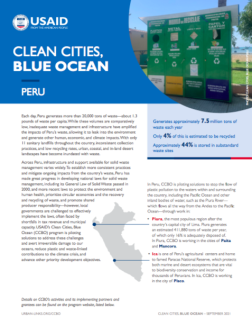According to the Ministry of Environment, each day Peru generates more than 21,600 metric tons of waste— about 0.81 kilograms of waste per capita. While these volumes are comparatively low, inadequate waste management and infrastructure have amplified the impacts of Peru’s waste. With inadequate waste management practices, low recycling rates, and only 65 sanitary landfills nationwide, communities across Peru are now facing significant waste management challenges.
USAID’s Clean Cities, Blue Ocean program is piloting solutions to address these challenges and avert irreversible damage to our oceans, reduce plastic and waste-linked contributions to the climate crisis, and advance other priority development objectives.
OUR LOCAL SYSTEMS APPROACH
In Peru, USAID is designing and implementing holistic strategies that address each step in the waste value chain—from production to end use—prioritizing the most inclusive, economically viable, and environmentally sustainable solutions. The program leverages local, national, and international technical expertise, paired with its grants program to test, scale, and share locally-led, innovative, and proven solutions. Where possible, the program learns from and expands upon the success of proven initiatives by local government and non-governmental organizations.
The program’s work supports USAID’s Five Building Blocks for Reduced Ocean Plastic Pollution:
- Data-driven policies for circularity
- Effective solid services and investment
- Green jobs and local innovations
- Sustained behavior change to reduce single-use plastics
- An inclusive, just, and equitable circularity system
RESULTS
In Peru, program impacts (to date) include:
- Over 5,720 metric tons of waste (including nearly 700 metric tons of plastic—the equivalent of nearly 75 million plastic bottles) safely managed and prevented from entering into drainage canals, rivers, streams—and ultimately the ocean.
- More than 68,000 households and businesses, or nearly 1.3 million people, are now participating in or benefitting from new and improved solid waste services through their local government’s partnership with the program. This includes local “Recicla” programs, as well as improved local waste collection to extend services to previously unserved parts of the cities.
- Over 970 people trained from local government, informal waste sector, and local organizations to build local capacity for solid waste management planning and programs.
- Over $1.4 million in grant funding awarded to local organizations and in-kind support to local goverment to implement effective, locally-led waste management solutions.
- Ten new or improved policies or plans introduced to advance local circular economies.

